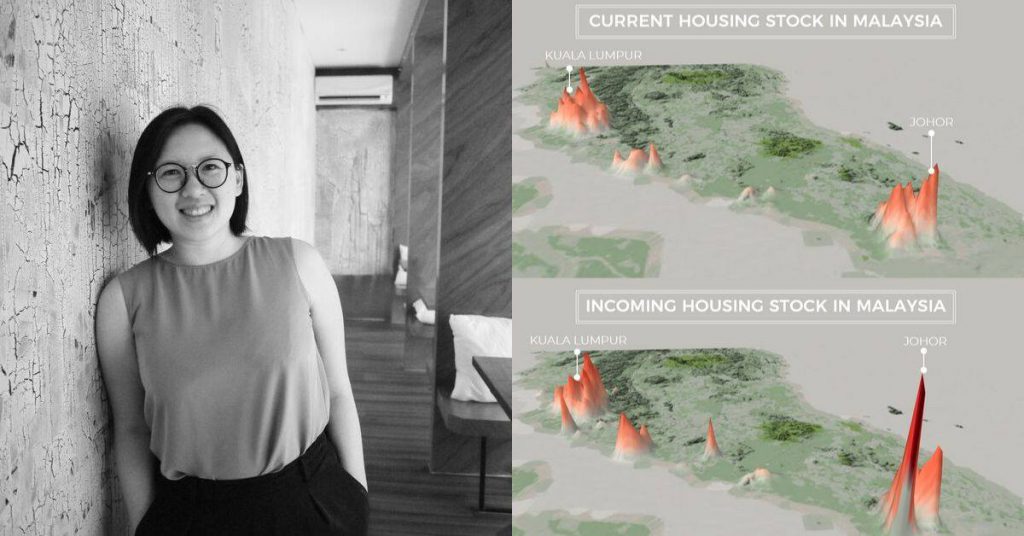In Malaysia, there’s a huge multi-billion ringgit problem that has been several years in the making. No, it’s not that other billion-dollar whale you might be thinking about.
At the end of 2018, there were 30,115 unsold completed residential units in Malaysia. This is a 48.35% increase from the 20,304 units a year before.
If you factor in serviced apartments and small offices/home offices (SoHos), the overhang value rises to 40,916 units, valued at RM27.38bil.
Dictionary Time: An overhang is a situation where there is an oversupply or surplus of something, often leading to negative effects in the market.
These completed yet empty units drain and strain resources for all parties involved: banks, consumers, and developers.
UrbanMetry was founded in 2014 to combat this exact type of inefficiency.
Cha-Ly, the founder and CEO of UrbanMetry, told us, “The aspiration has always been to reduce the inefficiency in the housing and property market to shape a better city. The city is shaped not only by architects and planners but financiers, developers, policy-makers and the people in it. Information is the key ingredient that is crippling its ability to reach the city’s full potential.”
But Let’s Go A Bit Deeper Into How It Works
Think of UrbanMetry like a city MRI machine. Stakeholders within the property and housing markets can go to UrbanMetry for a scan of the market for “diagnostic” or planning purposes.
This data is used by architects, financiers, developers, and policy-makers to plan our cities better, see what are dead spots, and figure out how to prevent glut or oversupply in a place.
“Why can’t they do it themselves?”, you may ask.
UrbanMetry discovered that public data is often “dirty and messy”. Hence, to extract the full potential of the data, UrbanMetry goes through an exhaustive process of “cleaning”.
To do this cost-effectively, the team has built a variety of automation tech including AI bots and sorting algorithms to ensure the integrity of the information. Cha-Ly described the company as akin to a data recycling machine.
On the surface, you might assume UrbanMetry is just another data collection company. But, how it collects and analyses data is what matters, revealing trends and patterns in the built environment.
For example, the data UrbanMetry collects can be turned into an infographic to show how a city feeds its people, by linking the number of halal restaurants in a specific area.

Doing The “Dirty” Work
Tackling an “old” industry like the property behemoth will come with a fair number of challenges.
As Cha-Ly said, “We are trying to apply tech to the construction industry that is led by very experienced individuals.”
Being a female-led business, she also found that dealing with clients in a male-dominated industry took more effort in the beginning.
“But, once your product delivers, it no longer matters,” she told us.
It is also a task for the long haul.
“To convince the industry that data can help them make a better diagnosis of the market requires a lot of patience and time. After all, the construction cycle is up to 5 years,” said Cha-Ly.
This means that for UrbanMetry to thrive and survive, they have to not only be profitable, but have a sustainable long-term strategy. And to do this, UrbanMetry needs to make it clear that its product delivers value to the market and economy.

They’re aided in this by Reapra, a venture builder with a strategic focus on developing sustainable businesses.
“Profit to me is not a strategy but proof that the market values what we do. We work well with Reapra because they are in line with me on this: that whatever we do, we have to bring value to the table, to our society,” said Cha-Ly.
Working with Reapra has also led them to valuable experiences that helped drive UrbanMetry’s growth.
“Reapra is very supportive of our ambitions, and sometimes that has resulted in us making strong reflections on our strategy. Once, they introduced me to a very important potential client that could take us to the next level,” said Cha-Ly.
Unfortunately, her team was not ready, and it taught her a crucial lesson: when opportunities come and you are not ready, you will lose them.
“Hence, Reapra helps to keep us on our toes to ensure we are constantly at the top of our game, ready to meet the next opportunity,” she shared.
Right now, she sees an opportunity to bring UrbanMetry’s tech to other emerging markets to help their builders, policy-makers and financiers make better decisions.
“We also hope the data can help increase the liquidity for mortgages for basic housing in markets that need it most,” said Cha-Ly.
- If you’re interested to find out more about Reapra and how they help to build sustainable businesses, you can check out their website here.
Feature Image Credit: UrbanMetry













